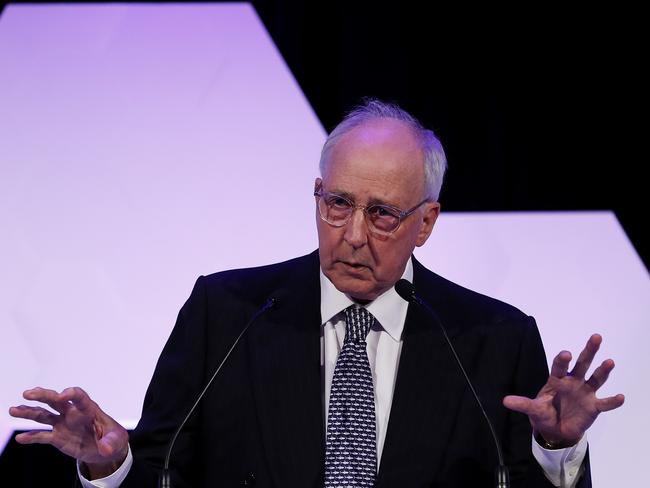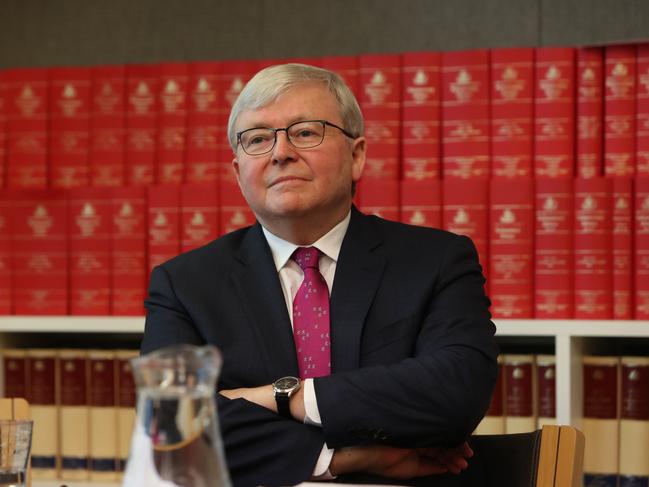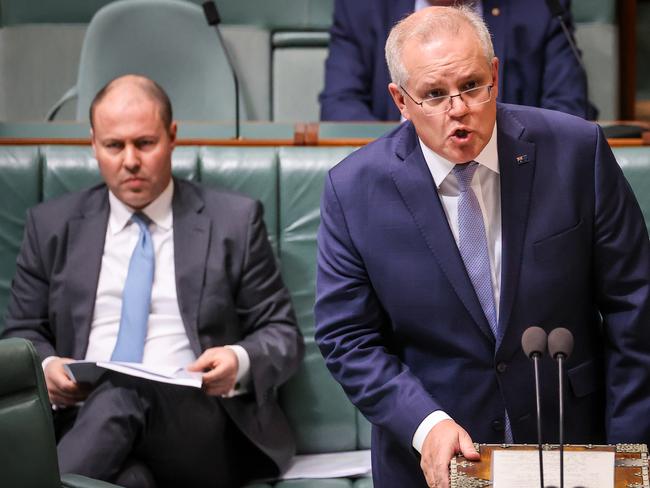Terry McCrann: Even if Morrison and Frydenberg wanted to stop the super increase they couldn’t
Whether Paul Keating and Kevin Rudd, are correct demanding super contributions rise to 12 per cent, they certainly are on the right side of politics because to abandon this would be political suicide, writes Terry McCrann.
Terry McCrann
Don't miss out on the headlines from Terry McCrann. Followed categories will be added to My News.
Paul Keating and Kevin Rudd have reached across the decades to — metaphorically — join hands to demand that compulsory superannuation contributions must continue to increase from their current 9.5 per cent of wages and salaries to the promised 12 per cent.
They have also joined hands to demand that the extra 2.5 per cent must be paid by employers and not by employees indirectly by way of lower wage increases.
Whether or not they are on the right side of either history or logic in their basic demand — in my judgment they are decidedly on the wrong side of both, and a bit more besides — they are going to prove to be, again, in my judgment, on the right side of politics.
Prime Minister Scott Morrison and his Treasurer, Josh Frydenberg, might want to stop the increase, although neither has said so explicitly; Frydenberg has so far only “mused” about the topic — but if they tried they would, in my judgment, fail.
Even people who should know better tend to talk loosely about the government “doing something”. In this case “doing something” would require legislation to pass the Senate.

The government does not have a majority in the Senate and I cannot see it getting sufficient votes from the cross bench, against the unqualified opposition from Labor and the Greens.
It would have to get three votes from somewhere among Queensland’s Pauline Hanson, who has two; Tasmania’s Jacqui Lambie; the last man standing from Nick Xenophon’s Centre Alliance Party, Stirling Griff; and Rex Patrick, a defector from that party. I can’t see any of them and certainly not three of them voting to snatch the savings of workers out of their super balances if not directly out of their wallets, no matter how much logic — or “logic” — there is to the argument.
That’s on the presumption they do want to be re-elected. If they need a reminder of the risk they would take — sorry, the political self-immolation they would embrace — I suggest they have a chat to Meg Lees.
Lees did the right thing for the nation by leading her Australian Democrats to give us John Howard and Peter Costello’s GST — and much broader tax reform — and in the process consigned herself and her party to political oblivion.

Even the fact she had negotiated a watered-down version availed her and her colleagues absolute nought.
There was an also much more significant, broader and longer-lasting negative consequence.
While we got the GST, we lost the half-rational, or indeed better than half-rational Dems, and replaced them with the totally — right out there in moon-land — irrational Greens. Hanson and maybe her offsider, Malcolm Roberts, (different election cycles) might be able to survive a vote to snatch away the workers’ 2.5 per cent, but none of the other three could — especially the two from SA, who are what was essentially a Xenophon brand that has all but evaporated anyway.
So, it’s just not going to happen. The focus must and will switch to who pays for it: employers or employees through even weaker wages growth? It’s a question that has taken on much greater potency for precisely the reason it has been bandied about — the virus and the recession that our nine governments have ordered; and the way this is going to continue to devastate both employers and workers well into the 2020s.
Putting it bluntly if somewhat crudely, employers — and I’m talking obviously in general terms — will be able to pay it only by trimming wages or cutting staff. Equally, workers would pay for it in even lower wages growth than they’ve been getting.

To borrow from the (mostly) late, great The Mamas and The Papas, the only ones getting fat on our $3 trillion compulsory super system are the managers of the money; clipping the ticket each and every year to the tune of around $30bn.
When it started back in the mid-1990s, those “ticket-clippers” were in corporate-owned retail funds; now they are increasingly in union-run industry funds.
But the actual people pocketing the billions are either literally the same or from the same business class: they’ve just switched employers.
RUDD AND KEATING SOULMATES
Well, they would say that — former PMs Keating and Rudd, that is. In their own similar but also rather different sad ways they are emotionally and even psychologically committed — and I mean committed — to 12 per cent.
Keating as treasurer and (temporary) backbencher conceived the compulsory super system; and then as PM legislated it.
To him, any move against it is an exercise of the most outrageous lese-majeste against the globe’s greatest human since Napoleon.
Even though, that is, it hasn’t worked out quite how he promised.
It was supposed to be 9 per cent in lieu of wages from the employer, 3 per cent from the worker directly and 3 per cent from the government.
The other 6 per cent never “arrived”. Now, half of it is to be extracted, again, from the employer.
Rudd, in turn was the PM who moved to impose that extra 3 per cent on employers; but back in 2010 he was of course cut off in his, well, “prime”. It was left to his successor, Julia Gillard, to actually deliver.
Now Rudd is vigorously defending Gillard’s delivery of his promise: hmm, there’s too much deep psychosis in that for me.
Originally published as Terry McCrann: Even if Morrison and Frydenberg wanted to stop the super increase they couldn’t
